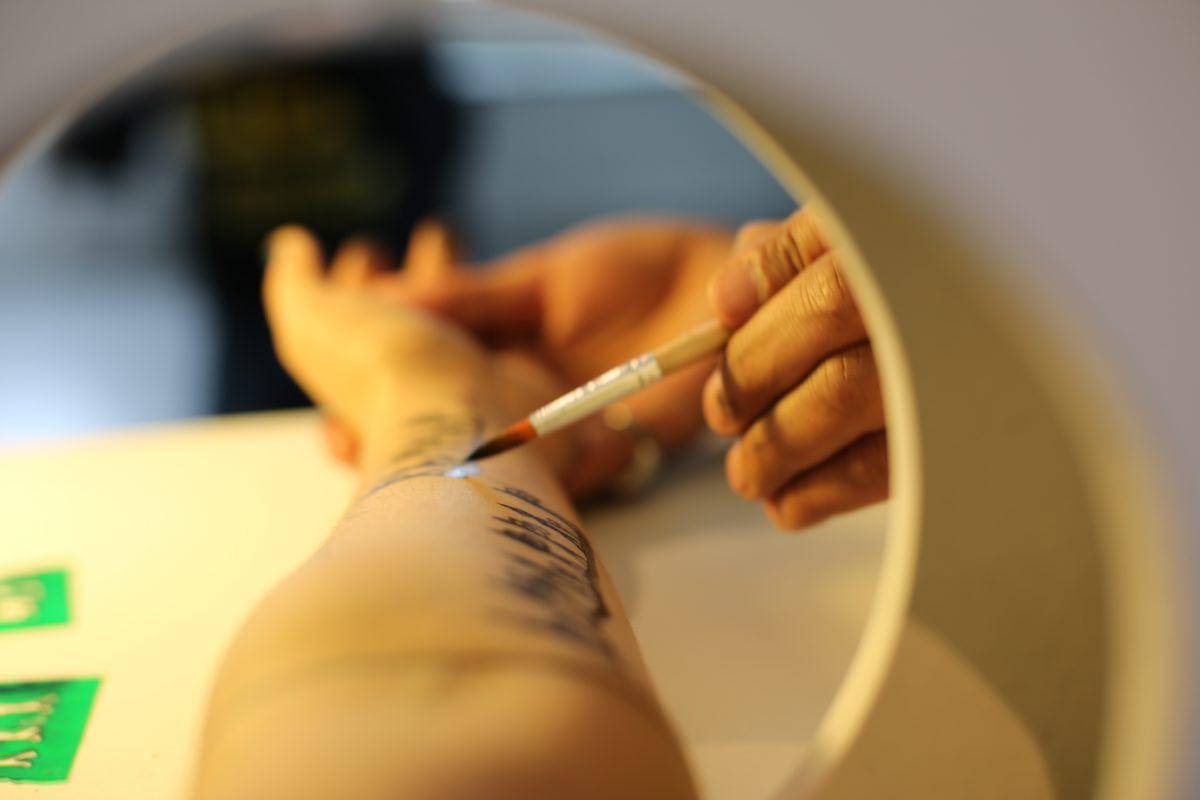
Presented in partnership with Bryn Mawr College, Fringe-goers will have the opportunity to step into the immersive works that deal with the stories of the 2011 Syrian uprising.
This is the first time El Khoury has presented her work in Philadelphia, a city she told PW she likes because of its rich history. The five pieces of the “ear-whispered” series, as well as speaker events with the artist, will take place throughout the city and at Bryn Mawr College.
“I feel like within this form of immersive pieces, there is a lot there that have political potential, like inviting audiences to bear witness to other people’s stories, but also inviting people to embody certain realities, to embody different character,” said El Khoury, who holds a PhD from Royal Holloway, University of London.
In addition to her many accolades and awards, El Khoury received the Anti Festival’s International Prize for Live Art. As part of the award, she is currently in Finland working on a new piece about the politicization of electricity in Lebanon, which is set to premier after the Fringe Festival and take place in a power plant.
Philadelphia Weekly spoke with the busy artist, across timezones, about her five pieces of the “ear-whispered” series: “Gardens Speak,” the world premiere of “Tell Me What I Can Do,” “As Far As My Fingertips Take Me,” “Camp Pause” and “Stories of Refuge.”
Gardens Speak
“I wanted the audience to feel that someone is actually talking to them from under the soil,” said El Khoury of “Gardens Speak.”
In Syria, many activists were killed and buried in gardens during the Assad regime. In “Garden Speak,” audience members will dig through a simulated garden to find one of 10 audios that tell the story, in first person, about one of the countless victims who were buried in gardens.
“[The audio] was made through interviews, through conversation with family members and friends of those who were killed at the beginning of the Syrian uprising,” explained El Khoury. “That was a long process of research. Just to understand why was that happening, but also to get some of these stories and then [write and record the] stories … in first person.”
El Khoury also wrote a book, “Garden Speak” that will be available for purchase at “ear-whispered” events.
Gardens Speak | Sept. 12-23. Times vary. $20. Hepburn Teaching Theater at Bryn Mawr College, 150 N. Merion Ave., Bryn Mawr. fringearts.com/event/gardens-speak/
Tell Me What I Can Do
El Khoury received a lot of response to “Gardens Speak,” many in the form of letters asking the artist what they can do to help with the plight in Syria. In turn, El Khoury has transformed the growing piles of letters into an art installation that spells out the sentence, “Tell Me What I Can Do.”
“‘Gardens Speak’ was about so much oppression. What it means to me now is also to look back at that early period of the Arab uprising and think how helpful [people] were and we were even at the time where there was death being forced on us,” said El Khoury. “But now, with what’s happening around us and what happened in Syria, it’s very hard to see that hope again. And that’s what I tried to also reflect in ‘Tell Me What I Can Do.’”
In this world premiere, the installation also highlights responses to “Gardens Speak” from activists from the uprising. However, some of the responses could not make it into the piece, since they were confiscated by police.
“‘Tell Me What I Can Do’ is reflecting on the last five years, and what happened to us and where have we been, all of us, even early collaborators. Where are they now in the world after trying to find refuge in different places,” explained El Khoury. “But [it is] also all of the material that I’ve accumulated … to reflect more generally about what artists do with all the baggage that they carry with them.”
Tell Me What I Can Do | Sept. 12-16, 19-23. Times vary. Free. Goodhart Hall Common Room at Bryn Mawr College, 150 N Merion Ave. fringearts.com/event/tell-me-what-i-can-do/
As Far As My Fingertips Take Me
In an intimate, one-on-one experience with a Palestinian refugee in Syria, audience members only use the senses of touch and sound. Divided by a gallery wall, visitors place their arm through a hole on which musician and street artist Basel Zaraa, from the Yarmouk Camp, will draw the story of a Syrian refugee’s travels to Sweden.
During the 12-minute session, participants will listen to an audio about stories of border discrimination.
“The idea was to actually actively invite someone who had the experience of being a refugee, but as part of his identity, to be born into it, and for us to reflect on the fact that this is not something that just happened now,” said El Khoury. “[The performance] started as a conversation between the Baseel almost a joke of me saying, ‘maybe people need to feel, like literally feel, a refugee to understand them.’
Camp Pause
In collaboration with Abir Saksouk from the Dictaphone Group, a research and performance collective El Khoury co-founded, “Camp Pause” is a video-based performance of four people living in the Rashidieh Refugee Camp.
Located on the coast of Lebanon, a sea separates the camp from Palestine.
“‘Camp Pause’ is looking at people’s relationship with that sea as an open space, but at the same time as people who are being trapped within the confinement of a camp,” explained El Khoury. “The video came naturally as a format there, because you cannot … bring much out of it, other than sound and video.”
Camp Pause |Sept. 12-Dec. 14. Times vary. Free. Canaday Library Rare Book Room at Bryn Mawr College, 150 N. Merion Ave, Bryn Mawr. fringearts.com/event/camp-pause/
Stories of Refuge
What is a day in the life of a refugee?
“Stories of Refuge” centers on the many Syrians who fled after the 2011 uprising to European countries, many who entered through unofficial borders, to find refuge.
In collaboration with Petra Serhal from Dictaphone Group, El Khoury gave Syrian refugees in Munich, Germany, hidden cameras so they could film their lives for a day. ‘ El Khoury and Serhal then added audio to the visuals captured of interviews with the refugees.
“The video has also been used out of necessity because they were filmed in camps where refugees are,” explained El Khoury about the use of video. “People are not allowed to enter these spaces, some of them are quite surveilled.”
Audiences can watch the footage while sitting on metal bunk beds.
Stories of Refuge | Sept 6-28. 11am-5pm. Free. Twelve Gates Arts, 51 N. 2nd St. fringearts.com/event/stories-of-refuge/
TWITTER: @ANDREAJCANTOR




